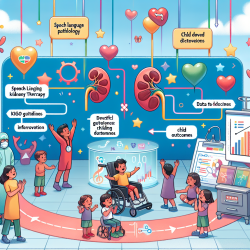Introduction
The COVID-19 pandemic has introduced unprecedented challenges in workplace health surveillance, particularly for individuals with chronic health conditions like cancer. The research article "Workplace health surveillance and COVID-19: algorithmic health discrimination and cancer survivors" explores how algorithmic decision-making (ADM) can exacerbate workplace inequalities. As practitioners, understanding these dynamics is crucial to improving outcomes for affected individuals.
Understanding Algorithmic Health Discrimination
Algorithmic decision-making involves using computational processes to analyze data and inform decisions. While ADM aims to enhance efficiency and reduce bias, it can inadvertently perpetuate discrimination, especially against cancer survivors. The integration of ADM with COVID-19 health surveillance has led to increased data collection, potentially exposing private health information and leading to biased employment decisions.
Implications for Practitioners
Practitioners can play a pivotal role in addressing these challenges by:
- Advocating for Policy Change: Engage with policymakers to revise workplace policies that ensure ADM processes are transparent and equitable.
- Promoting Inclusive Data Practices: Encourage the use of diverse data sets that reflect the experiences of individuals across the health spectrum, ensuring ADM systems are fair and representative.
- Educating Employers: Provide training to employers on the potential biases in ADM and the importance of safeguarding employee health data.
- Supporting Affected Individuals: Offer guidance and resources to cancer survivors navigating workplace discrimination, helping them understand their rights and available accommodations.
Encouraging Further Research
While the current research provides valuable insights, further studies are needed to explore the long-term impacts of ADM on workplace equality. Practitioners are encouraged to contribute to this body of knowledge by:
- Conducting Longitudinal Studies: Investigate the evolving nature of ADM and its effects on different demographics over time.
- Exploring Interdisciplinary Approaches: Collaborate with experts in technology, law, and public health to develop comprehensive strategies that address algorithmic discrimination.
- Developing Case Studies: Document real-world examples of algorithmic discrimination to highlight its impact and inform policy recommendations.
Conclusion
As we navigate the complexities of COVID-19 health surveillance and ADM, practitioners have a unique opportunity to advocate for equitable practices that protect vulnerable populations. By leveraging research and promoting informed decision-making, we can work towards a more inclusive and fair workplace environment for all.
To read the original research paper, please follow this link: Workplace health surveillance and COVID-19: algorithmic health discrimination and cancer survivors.










